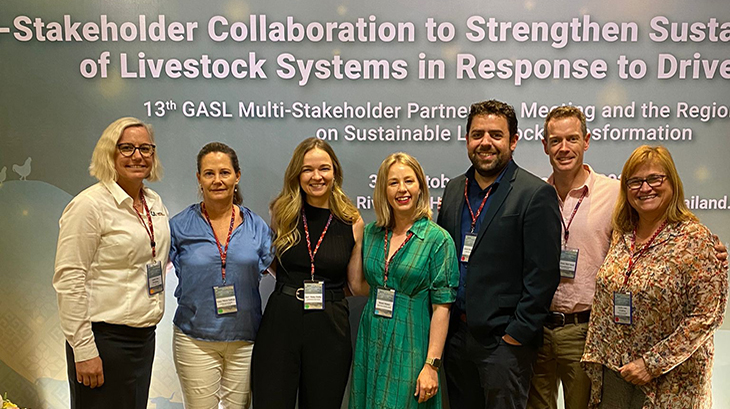GASL sparks conversations on challenges for livestock

Bonnie Skinner (middle), Sheep Producers Australia CEO, at the Global Agenda for Sustainable Livestock (GASL)
Sheep Producers Australia Chief Executive Officer, Bonnie Skinner, has returned from a high-level meeting of 275 delegates from 55 countries in Thailand in December that explored the diversity of approaches to sustainable livestock production.
The Global Agenda for Sustainable Livestock (GASL) is a multistakeholder partnership that aims to enhance the sustainability of the livestock sector across the world.
GASL, in collaboration with the Food and Agriculture Organization of the United Nations (FAO), the Department of Livestock Development of Thailand and Chiang Mai University, hosted the conference in Chiang Mai with the theme of “Multi-stakeholder Collaboration to Strengthen Sustainability and Resilience of Livestock Systems in Response to Drivers of Change”.
“The debate is very diverse when you bring developed and developing nations together, but it’s important to have these conversations to find opportunities for collaboration and to share information and ideas to achieve global sustainability goals,” Ms Skinner said.
“Australia is investing significantly in research and technology aimed at mitigating greenhouse gas emissions. Other countries face different constraints – climate initiatives intersect with initiatives around economic growth and energy security. Finding the common ground to tackle complex global issues affecting sustainability is a challenge, but having all countries contributing to the agenda is critical.
“Gender equality is also critical for the sustainable development of the livestock sector. At the conference we discussed the important role women play in animal production, and the many obstacles women face, in some countries, to independently access land and capital,” she said.
“Australia has a strong movement towards increasing females at the board level, in senior management and leadership positions. We are making progress, but there is more to be done. Both represent very different and important stages of a journey towards gender equality of all women.”
The GASL meeting featured four sessions focused on specific drivers of change:
- geopolitical and socio-economic drivers
- health and disease drivers
- environmental drivers
- innovation and knowledge drivers.
Each session had introductory presentations from the South-East Asia region, as well as panel discussions that provided insights into significant drivers, their impacts, and concrete solutions to enhance sustainable livestock systems.
Ms Skinner said one of the most inspirational workshops focused on ways to engage youth in agriculture and all countries shared the challenge of trying to elevate the voice of youth to be heard amongst decision makers.
“The discussions around the establishment of extensive youth networks and models for engagement to enhance participation in the livestock sector, to help create and promote employment opportunities for young people but also enhance youth empowerment.
“These networks are seeing youth empowered and having increased interest in sustainability issues, but they need to be elevated to a space where they can have their voice heard and make a difference.”
The impact of geopolitical conflicts was also a hot topic that Ms Skinner suggested may require a renewed focus for Australian agriculture. Delegates discussed the detrimental effects of conflict on incomes in developing countries, disruption to livestock production and how conflict has contributed to global inflation.
There was also debate over whether plant-based meats had the potential to disrupt global livestock production, and a major focus on technology and innovation drivers for sustainability.
“There was significant discussion around biosecurity challenges facing many countries and the One Health approach to managing biosecurity risks, which served as a reminder of how fortunate Australia is to be free of many of those diseases,” she said.
“There was also a lot of interest in Australia’s climate policy and the research the Australian livestock sector is undertaking into methane mitigation, genetic technologies and the potential productivity enhancements that could be simultaneously achieved.
“It was a valuable opportunity to discuss the role that livestock play in the climate agenda and the range of climate policy issues facing the sector in the lead up to COP28, which many delegates were also attending.”
More information
Contact:
Resources: